AASW: Reflection on Social Work Experience, Ethics, and Practise
VerifiedAdded on 2023/06/13
|7
|1954
|340
Essay
AI Summary
This essay presents a reflective account of a social work student's experiences in two distinct settings, focusing on ethical considerations and the application of professional values. The first experience involves working with a young boy with a history of violence and trauma, where the student grapples with ethical dilemmas in building trust and eliciting information. The second experience details work with orphans in Africa, highlighting the importance of trust and ethical practice in addressing childhood trauma, while also contrasting it with unethical practices employed by another counselor. The essay analyzes these experiences through the lens of the Australian Association of Social Workers (AASW) guidelines, particularly concerning child protection and the need for culturally sensitive, family-focused, and child-centered approaches. It further discusses the importance of risk assessment, therapeutic interventions, and advocacy for children's rights, concluding with a reflection on the role of a social worker in implementing ethical practices and tailoring strategies to meet the specific needs of each case.
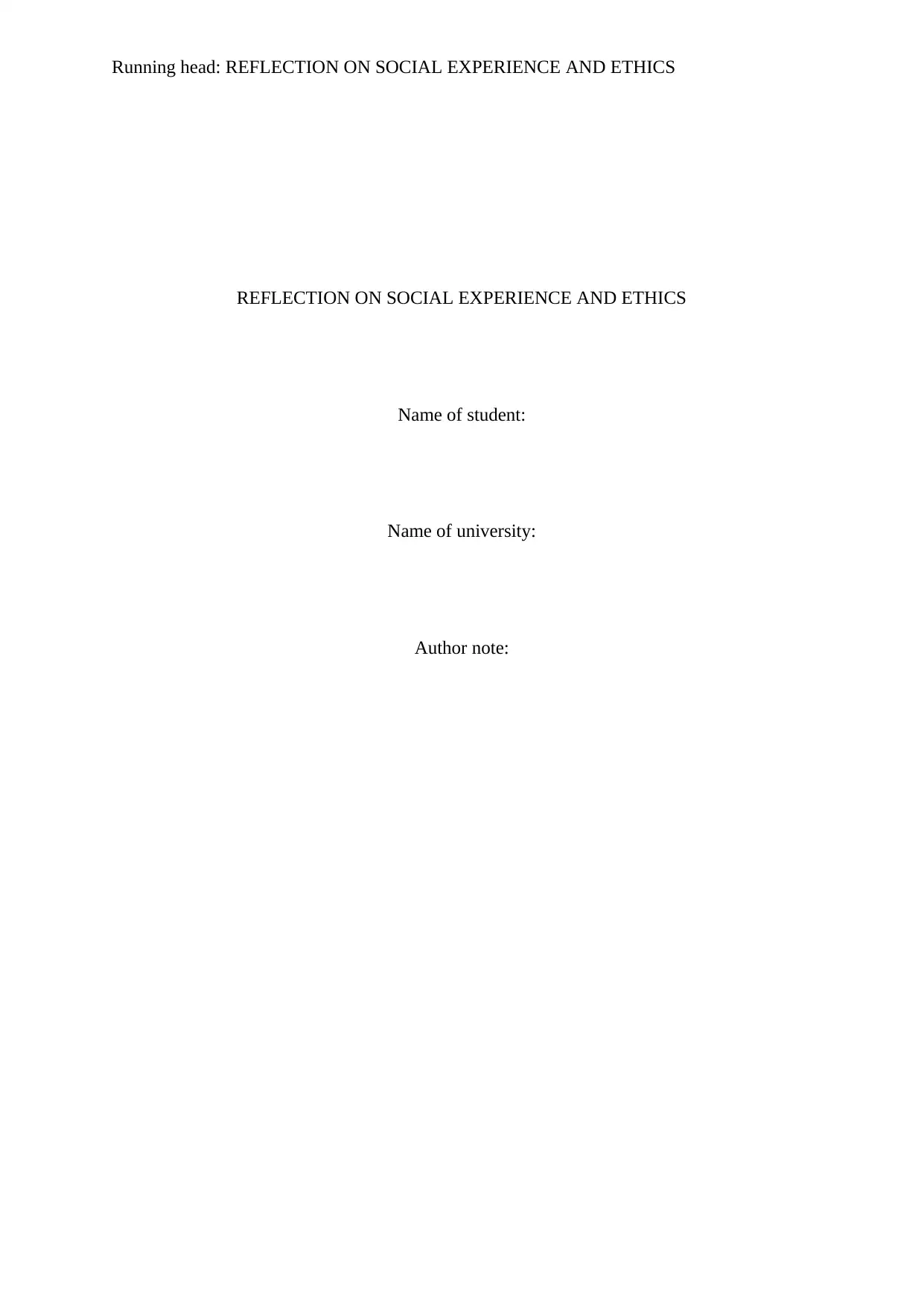
Running head: REFLECTION ON SOCIAL EXPERIENCE AND ETHICS
REFLECTION ON SOCIAL EXPERIENCE AND ETHICS
Name of student:
Name of university:
Author note:
REFLECTION ON SOCIAL EXPERIENCE AND ETHICS
Name of student:
Name of university:
Author note:
Paraphrase This Document
Need a fresh take? Get an instant paraphrase of this document with our AI Paraphraser
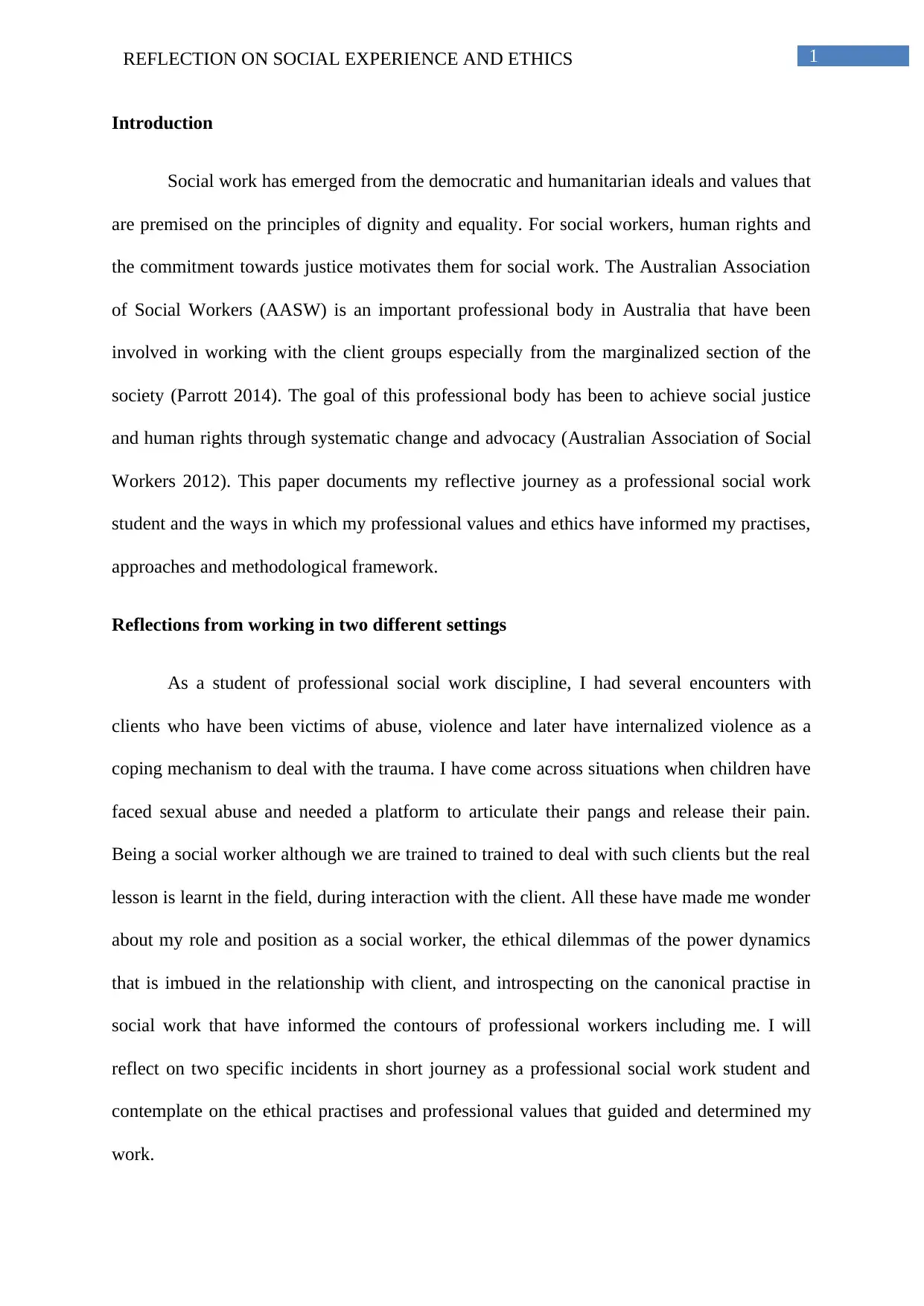
1REFLECTION ON SOCIAL EXPERIENCE AND ETHICS
Introduction
Social work has emerged from the democratic and humanitarian ideals and values that
are premised on the principles of dignity and equality. For social workers, human rights and
the commitment towards justice motivates them for social work. The Australian Association
of Social Workers (AASW) is an important professional body in Australia that have been
involved in working with the client groups especially from the marginalized section of the
society (Parrott 2014). The goal of this professional body has been to achieve social justice
and human rights through systematic change and advocacy (Australian Association of Social
Workers 2012). This paper documents my reflective journey as a professional social work
student and the ways in which my professional values and ethics have informed my practises,
approaches and methodological framework.
Reflections from working in two different settings
As a student of professional social work discipline, I had several encounters with
clients who have been victims of abuse, violence and later have internalized violence as a
coping mechanism to deal with the trauma. I have come across situations when children have
faced sexual abuse and needed a platform to articulate their pangs and release their pain.
Being a social worker although we are trained to trained to deal with such clients but the real
lesson is learnt in the field, during interaction with the client. All these have made me wonder
about my role and position as a social worker, the ethical dilemmas of the power dynamics
that is imbued in the relationship with client, and introspecting on the canonical practise in
social work that have informed the contours of professional workers including me. I will
reflect on two specific incidents in short journey as a professional social work student and
contemplate on the ethical practises and professional values that guided and determined my
work.
Introduction
Social work has emerged from the democratic and humanitarian ideals and values that
are premised on the principles of dignity and equality. For social workers, human rights and
the commitment towards justice motivates them for social work. The Australian Association
of Social Workers (AASW) is an important professional body in Australia that have been
involved in working with the client groups especially from the marginalized section of the
society (Parrott 2014). The goal of this professional body has been to achieve social justice
and human rights through systematic change and advocacy (Australian Association of Social
Workers 2012). This paper documents my reflective journey as a professional social work
student and the ways in which my professional values and ethics have informed my practises,
approaches and methodological framework.
Reflections from working in two different settings
As a student of professional social work discipline, I had several encounters with
clients who have been victims of abuse, violence and later have internalized violence as a
coping mechanism to deal with the trauma. I have come across situations when children have
faced sexual abuse and needed a platform to articulate their pangs and release their pain.
Being a social worker although we are trained to trained to deal with such clients but the real
lesson is learnt in the field, during interaction with the client. All these have made me wonder
about my role and position as a social worker, the ethical dilemmas of the power dynamics
that is imbued in the relationship with client, and introspecting on the canonical practise in
social work that have informed the contours of professional workers including me. I will
reflect on two specific incidents in short journey as a professional social work student and
contemplate on the ethical practises and professional values that guided and determined my
work.
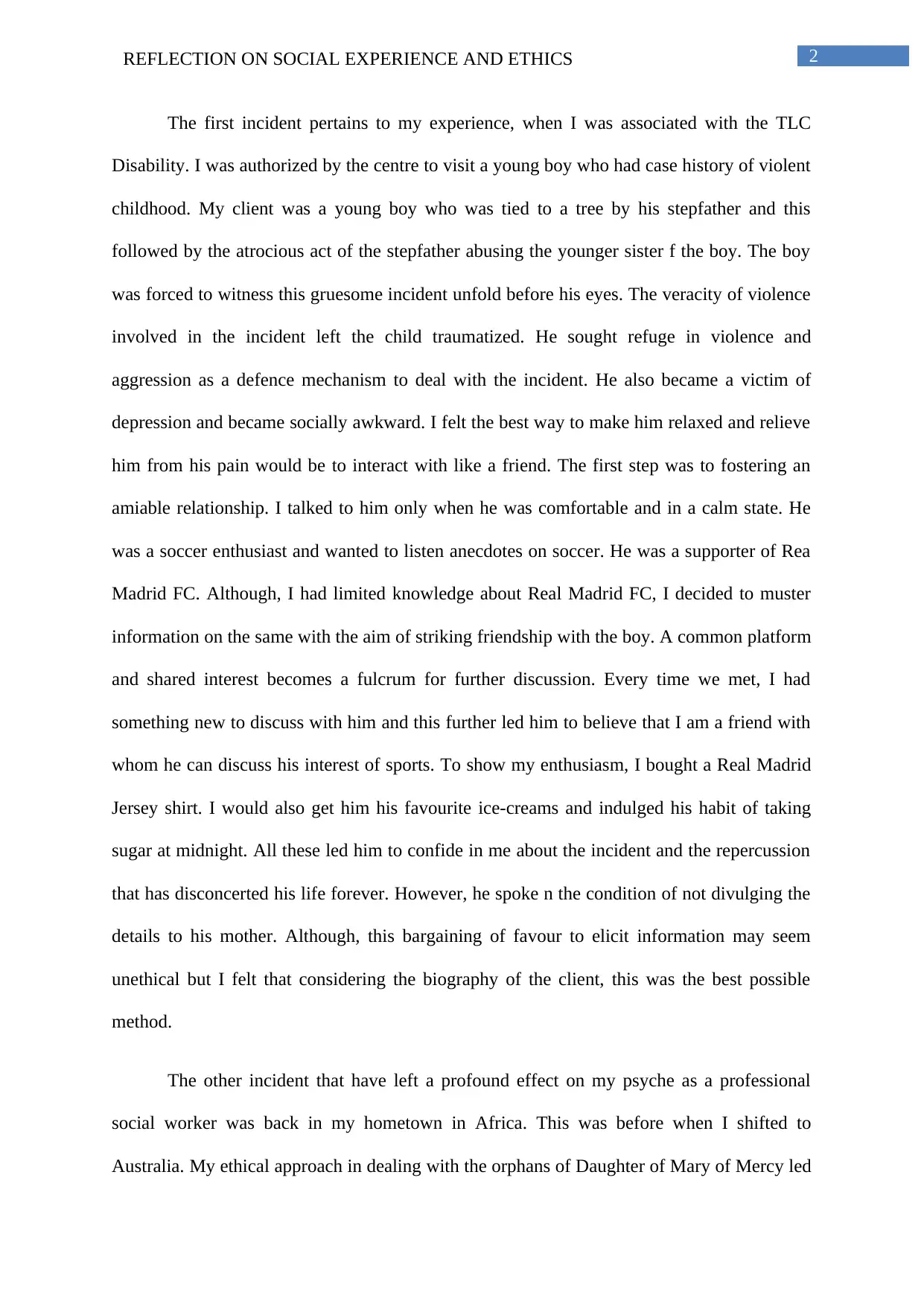
2REFLECTION ON SOCIAL EXPERIENCE AND ETHICS
The first incident pertains to my experience, when I was associated with the TLC
Disability. I was authorized by the centre to visit a young boy who had case history of violent
childhood. My client was a young boy who was tied to a tree by his stepfather and this
followed by the atrocious act of the stepfather abusing the younger sister f the boy. The boy
was forced to witness this gruesome incident unfold before his eyes. The veracity of violence
involved in the incident left the child traumatized. He sought refuge in violence and
aggression as a defence mechanism to deal with the incident. He also became a victim of
depression and became socially awkward. I felt the best way to make him relaxed and relieve
him from his pain would be to interact with like a friend. The first step was to fostering an
amiable relationship. I talked to him only when he was comfortable and in a calm state. He
was a soccer enthusiast and wanted to listen anecdotes on soccer. He was a supporter of Rea
Madrid FC. Although, I had limited knowledge about Real Madrid FC, I decided to muster
information on the same with the aim of striking friendship with the boy. A common platform
and shared interest becomes a fulcrum for further discussion. Every time we met, I had
something new to discuss with him and this further led him to believe that I am a friend with
whom he can discuss his interest of sports. To show my enthusiasm, I bought a Real Madrid
Jersey shirt. I would also get him his favourite ice-creams and indulged his habit of taking
sugar at midnight. All these led him to confide in me about the incident and the repercussion
that has disconcerted his life forever. However, he spoke n the condition of not divulging the
details to his mother. Although, this bargaining of favour to elicit information may seem
unethical but I felt that considering the biography of the client, this was the best possible
method.
The other incident that have left a profound effect on my psyche as a professional
social worker was back in my hometown in Africa. This was before when I shifted to
Australia. My ethical approach in dealing with the orphans of Daughter of Mary of Mercy led
The first incident pertains to my experience, when I was associated with the TLC
Disability. I was authorized by the centre to visit a young boy who had case history of violent
childhood. My client was a young boy who was tied to a tree by his stepfather and this
followed by the atrocious act of the stepfather abusing the younger sister f the boy. The boy
was forced to witness this gruesome incident unfold before his eyes. The veracity of violence
involved in the incident left the child traumatized. He sought refuge in violence and
aggression as a defence mechanism to deal with the incident. He also became a victim of
depression and became socially awkward. I felt the best way to make him relaxed and relieve
him from his pain would be to interact with like a friend. The first step was to fostering an
amiable relationship. I talked to him only when he was comfortable and in a calm state. He
was a soccer enthusiast and wanted to listen anecdotes on soccer. He was a supporter of Rea
Madrid FC. Although, I had limited knowledge about Real Madrid FC, I decided to muster
information on the same with the aim of striking friendship with the boy. A common platform
and shared interest becomes a fulcrum for further discussion. Every time we met, I had
something new to discuss with him and this further led him to believe that I am a friend with
whom he can discuss his interest of sports. To show my enthusiasm, I bought a Real Madrid
Jersey shirt. I would also get him his favourite ice-creams and indulged his habit of taking
sugar at midnight. All these led him to confide in me about the incident and the repercussion
that has disconcerted his life forever. However, he spoke n the condition of not divulging the
details to his mother. Although, this bargaining of favour to elicit information may seem
unethical but I felt that considering the biography of the client, this was the best possible
method.
The other incident that have left a profound effect on my psyche as a professional
social worker was back in my hometown in Africa. This was before when I shifted to
Australia. My ethical approach in dealing with the orphans of Daughter of Mary of Mercy led
⊘ This is a preview!⊘
Do you want full access?
Subscribe today to unlock all pages.

Trusted by 1+ million students worldwide
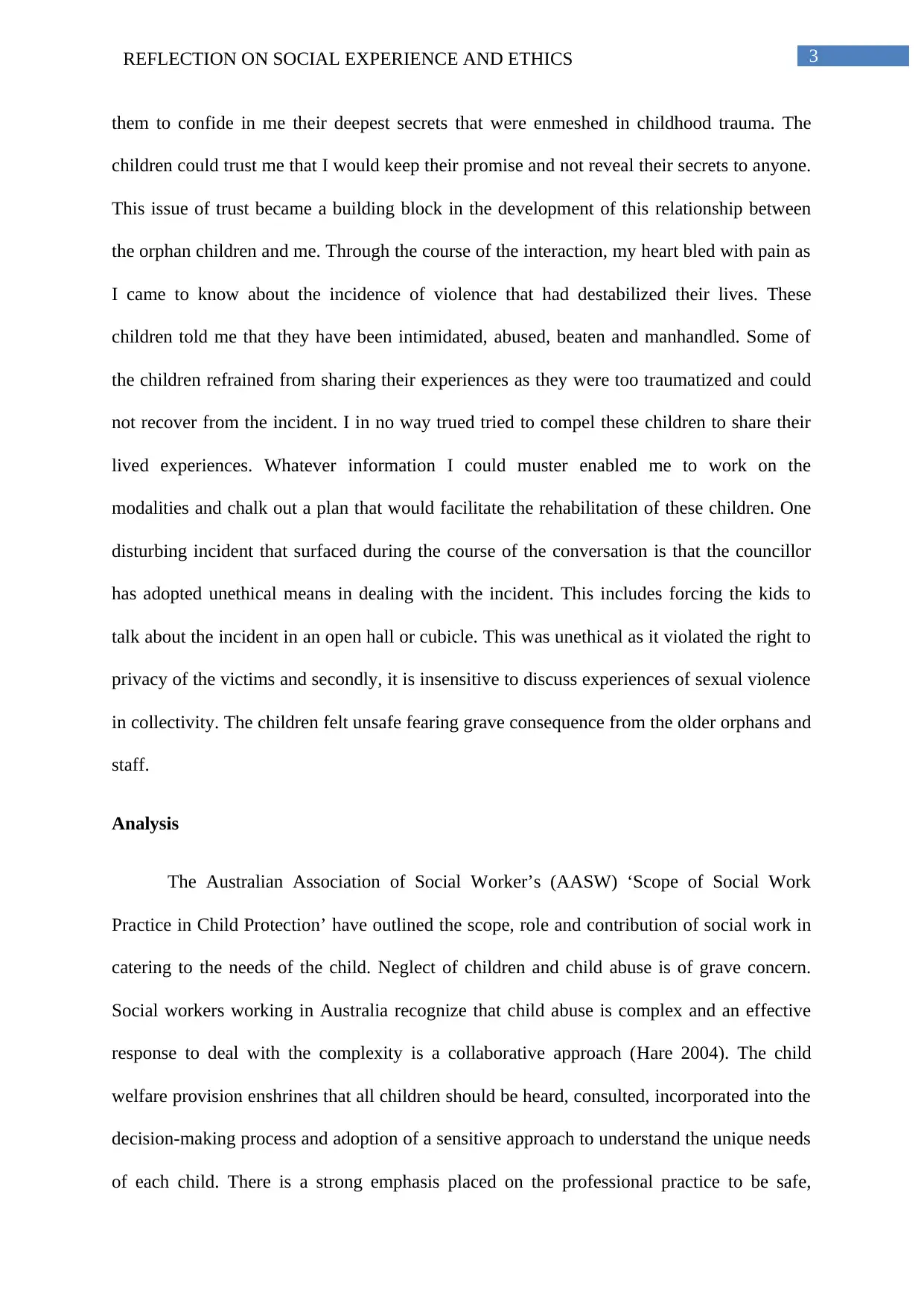
3REFLECTION ON SOCIAL EXPERIENCE AND ETHICS
them to confide in me their deepest secrets that were enmeshed in childhood trauma. The
children could trust me that I would keep their promise and not reveal their secrets to anyone.
This issue of trust became a building block in the development of this relationship between
the orphan children and me. Through the course of the interaction, my heart bled with pain as
I came to know about the incidence of violence that had destabilized their lives. These
children told me that they have been intimidated, abused, beaten and manhandled. Some of
the children refrained from sharing their experiences as they were too traumatized and could
not recover from the incident. I in no way trued tried to compel these children to share their
lived experiences. Whatever information I could muster enabled me to work on the
modalities and chalk out a plan that would facilitate the rehabilitation of these children. One
disturbing incident that surfaced during the course of the conversation is that the councillor
has adopted unethical means in dealing with the incident. This includes forcing the kids to
talk about the incident in an open hall or cubicle. This was unethical as it violated the right to
privacy of the victims and secondly, it is insensitive to discuss experiences of sexual violence
in collectivity. The children felt unsafe fearing grave consequence from the older orphans and
staff.
Analysis
The Australian Association of Social Worker’s (AASW) ‘Scope of Social Work
Practice in Child Protection’ have outlined the scope, role and contribution of social work in
catering to the needs of the child. Neglect of children and child abuse is of grave concern.
Social workers working in Australia recognize that child abuse is complex and an effective
response to deal with the complexity is a collaborative approach (Hare 2004). The child
welfare provision enshrines that all children should be heard, consulted, incorporated into the
decision-making process and adoption of a sensitive approach to understand the unique needs
of each child. There is a strong emphasis placed on the professional practice to be safe,
them to confide in me their deepest secrets that were enmeshed in childhood trauma. The
children could trust me that I would keep their promise and not reveal their secrets to anyone.
This issue of trust became a building block in the development of this relationship between
the orphan children and me. Through the course of the interaction, my heart bled with pain as
I came to know about the incidence of violence that had destabilized their lives. These
children told me that they have been intimidated, abused, beaten and manhandled. Some of
the children refrained from sharing their experiences as they were too traumatized and could
not recover from the incident. I in no way trued tried to compel these children to share their
lived experiences. Whatever information I could muster enabled me to work on the
modalities and chalk out a plan that would facilitate the rehabilitation of these children. One
disturbing incident that surfaced during the course of the conversation is that the councillor
has adopted unethical means in dealing with the incident. This includes forcing the kids to
talk about the incident in an open hall or cubicle. This was unethical as it violated the right to
privacy of the victims and secondly, it is insensitive to discuss experiences of sexual violence
in collectivity. The children felt unsafe fearing grave consequence from the older orphans and
staff.
Analysis
The Australian Association of Social Worker’s (AASW) ‘Scope of Social Work
Practice in Child Protection’ have outlined the scope, role and contribution of social work in
catering to the needs of the child. Neglect of children and child abuse is of grave concern.
Social workers working in Australia recognize that child abuse is complex and an effective
response to deal with the complexity is a collaborative approach (Hare 2004). The child
welfare provision enshrines that all children should be heard, consulted, incorporated into the
decision-making process and adoption of a sensitive approach to understand the unique needs
of each child. There is a strong emphasis placed on the professional practice to be safe,
Paraphrase This Document
Need a fresh take? Get an instant paraphrase of this document with our AI Paraphraser
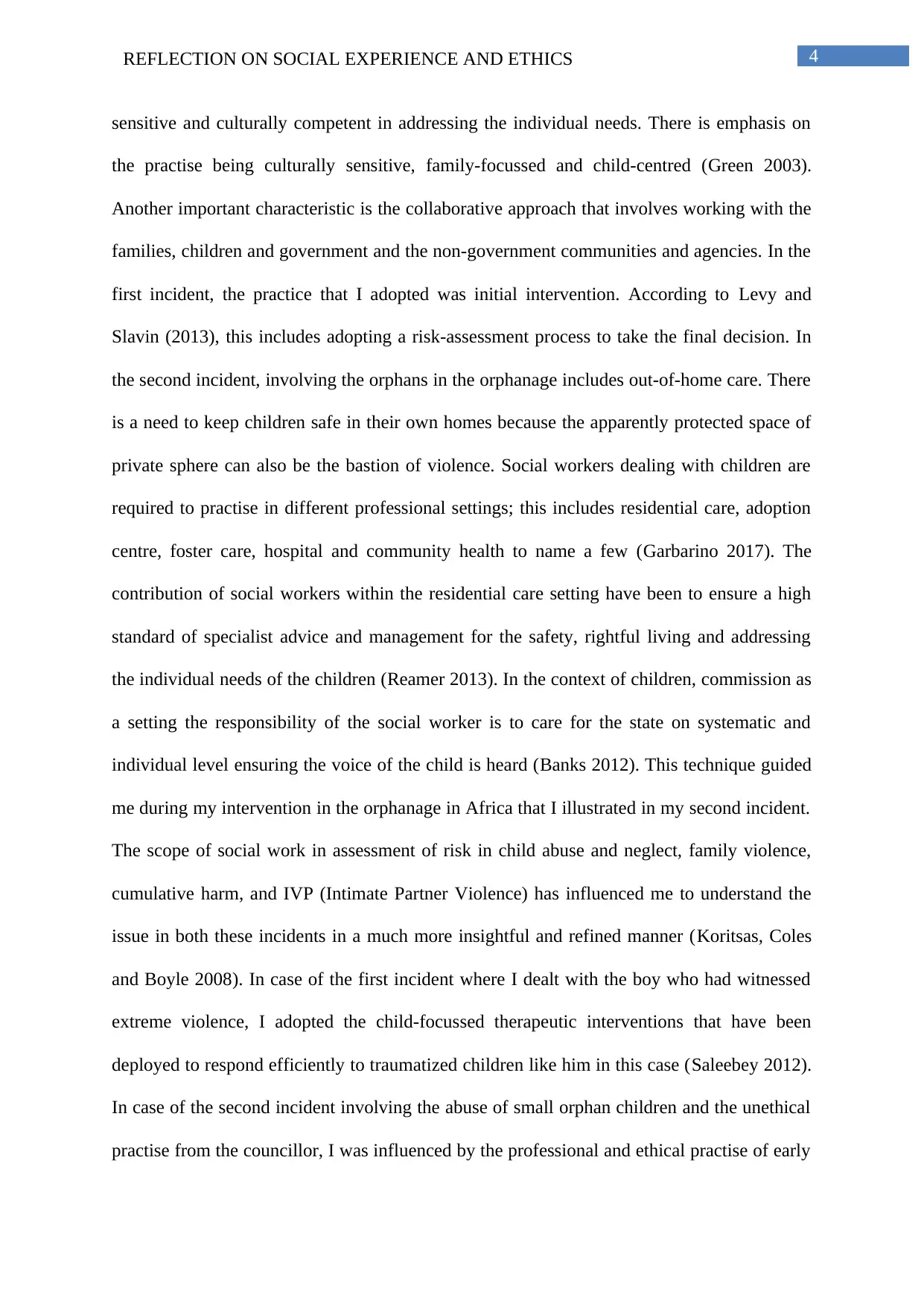
4REFLECTION ON SOCIAL EXPERIENCE AND ETHICS
sensitive and culturally competent in addressing the individual needs. There is emphasis on
the practise being culturally sensitive, family-focussed and child-centred (Green 2003).
Another important characteristic is the collaborative approach that involves working with the
families, children and government and the non-government communities and agencies. In the
first incident, the practice that I adopted was initial intervention. According to Levy and
Slavin (2013), this includes adopting a risk-assessment process to take the final decision. In
the second incident, involving the orphans in the orphanage includes out-of-home care. There
is a need to keep children safe in their own homes because the apparently protected space of
private sphere can also be the bastion of violence. Social workers dealing with children are
required to practise in different professional settings; this includes residential care, adoption
centre, foster care, hospital and community health to name a few (Garbarino 2017). The
contribution of social workers within the residential care setting have been to ensure a high
standard of specialist advice and management for the safety, rightful living and addressing
the individual needs of the children (Reamer 2013). In the context of children, commission as
a setting the responsibility of the social worker is to care for the state on systematic and
individual level ensuring the voice of the child is heard (Banks 2012). This technique guided
me during my intervention in the orphanage in Africa that I illustrated in my second incident.
The scope of social work in assessment of risk in child abuse and neglect, family violence,
cumulative harm, and IVP (Intimate Partner Violence) has influenced me to understand the
issue in both these incidents in a much more insightful and refined manner (Koritsas, Coles
and Boyle 2008). In case of the first incident where I dealt with the boy who had witnessed
extreme violence, I adopted the child-focussed therapeutic interventions that have been
deployed to respond efficiently to traumatized children like him in this case (Saleebey 2012).
In case of the second incident involving the abuse of small orphan children and the unethical
practise from the councillor, I was influenced by the professional and ethical practise of early
sensitive and culturally competent in addressing the individual needs. There is emphasis on
the practise being culturally sensitive, family-focussed and child-centred (Green 2003).
Another important characteristic is the collaborative approach that involves working with the
families, children and government and the non-government communities and agencies. In the
first incident, the practice that I adopted was initial intervention. According to Levy and
Slavin (2013), this includes adopting a risk-assessment process to take the final decision. In
the second incident, involving the orphans in the orphanage includes out-of-home care. There
is a need to keep children safe in their own homes because the apparently protected space of
private sphere can also be the bastion of violence. Social workers dealing with children are
required to practise in different professional settings; this includes residential care, adoption
centre, foster care, hospital and community health to name a few (Garbarino 2017). The
contribution of social workers within the residential care setting have been to ensure a high
standard of specialist advice and management for the safety, rightful living and addressing
the individual needs of the children (Reamer 2013). In the context of children, commission as
a setting the responsibility of the social worker is to care for the state on systematic and
individual level ensuring the voice of the child is heard (Banks 2012). This technique guided
me during my intervention in the orphanage in Africa that I illustrated in my second incident.
The scope of social work in assessment of risk in child abuse and neglect, family violence,
cumulative harm, and IVP (Intimate Partner Violence) has influenced me to understand the
issue in both these incidents in a much more insightful and refined manner (Koritsas, Coles
and Boyle 2008). In case of the first incident where I dealt with the boy who had witnessed
extreme violence, I adopted the child-focussed therapeutic interventions that have been
deployed to respond efficiently to traumatized children like him in this case (Saleebey 2012).
In case of the second incident involving the abuse of small orphan children and the unethical
practise from the councillor, I was influenced by the professional and ethical practise of early
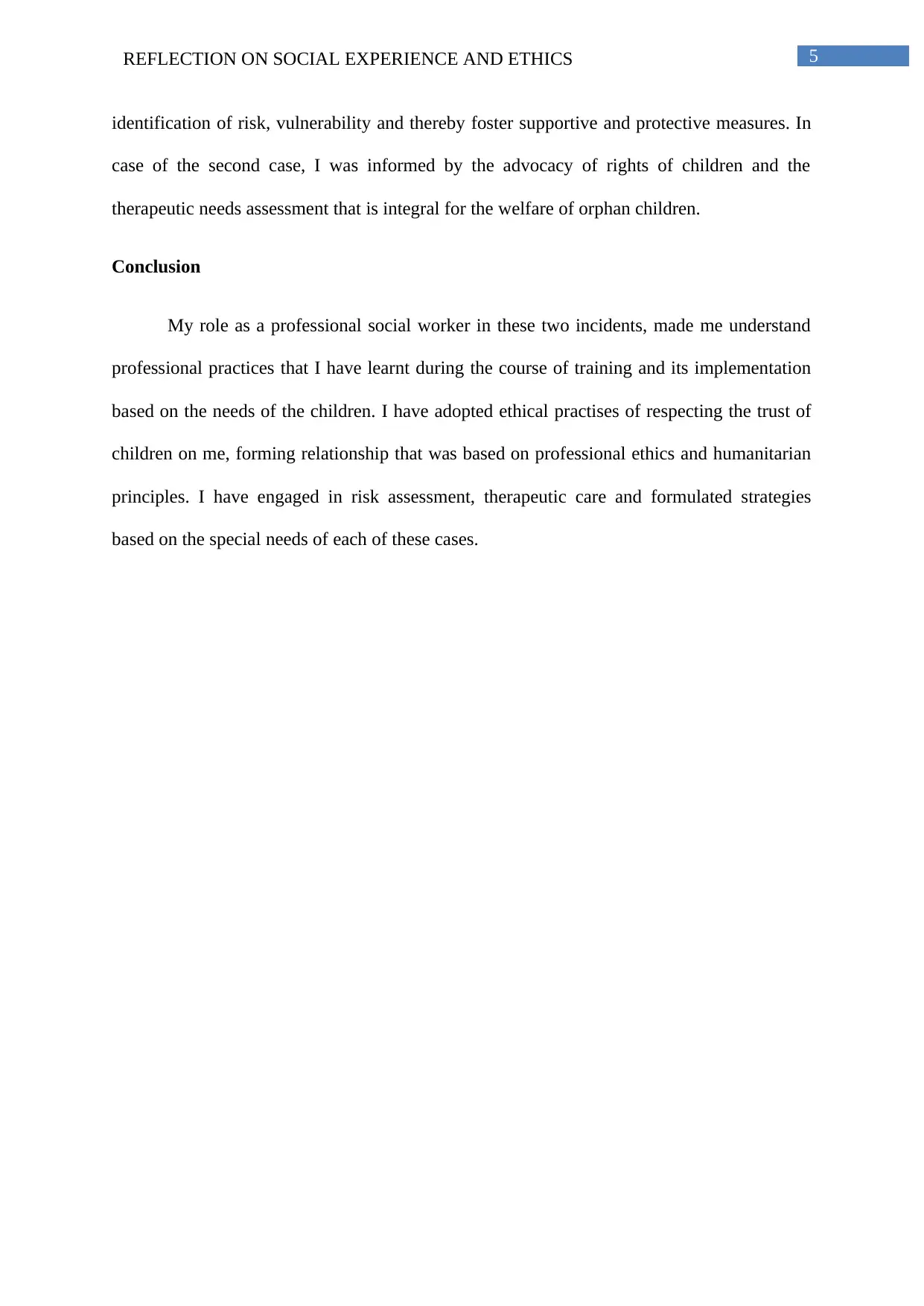
5REFLECTION ON SOCIAL EXPERIENCE AND ETHICS
identification of risk, vulnerability and thereby foster supportive and protective measures. In
case of the second case, I was informed by the advocacy of rights of children and the
therapeutic needs assessment that is integral for the welfare of orphan children.
Conclusion
My role as a professional social worker in these two incidents, made me understand
professional practices that I have learnt during the course of training and its implementation
based on the needs of the children. I have adopted ethical practises of respecting the trust of
children on me, forming relationship that was based on professional ethics and humanitarian
principles. I have engaged in risk assessment, therapeutic care and formulated strategies
based on the special needs of each of these cases.
identification of risk, vulnerability and thereby foster supportive and protective measures. In
case of the second case, I was informed by the advocacy of rights of children and the
therapeutic needs assessment that is integral for the welfare of orphan children.
Conclusion
My role as a professional social worker in these two incidents, made me understand
professional practices that I have learnt during the course of training and its implementation
based on the needs of the children. I have adopted ethical practises of respecting the trust of
children on me, forming relationship that was based on professional ethics and humanitarian
principles. I have engaged in risk assessment, therapeutic care and formulated strategies
based on the special needs of each of these cases.
⊘ This is a preview!⊘
Do you want full access?
Subscribe today to unlock all pages.

Trusted by 1+ million students worldwide
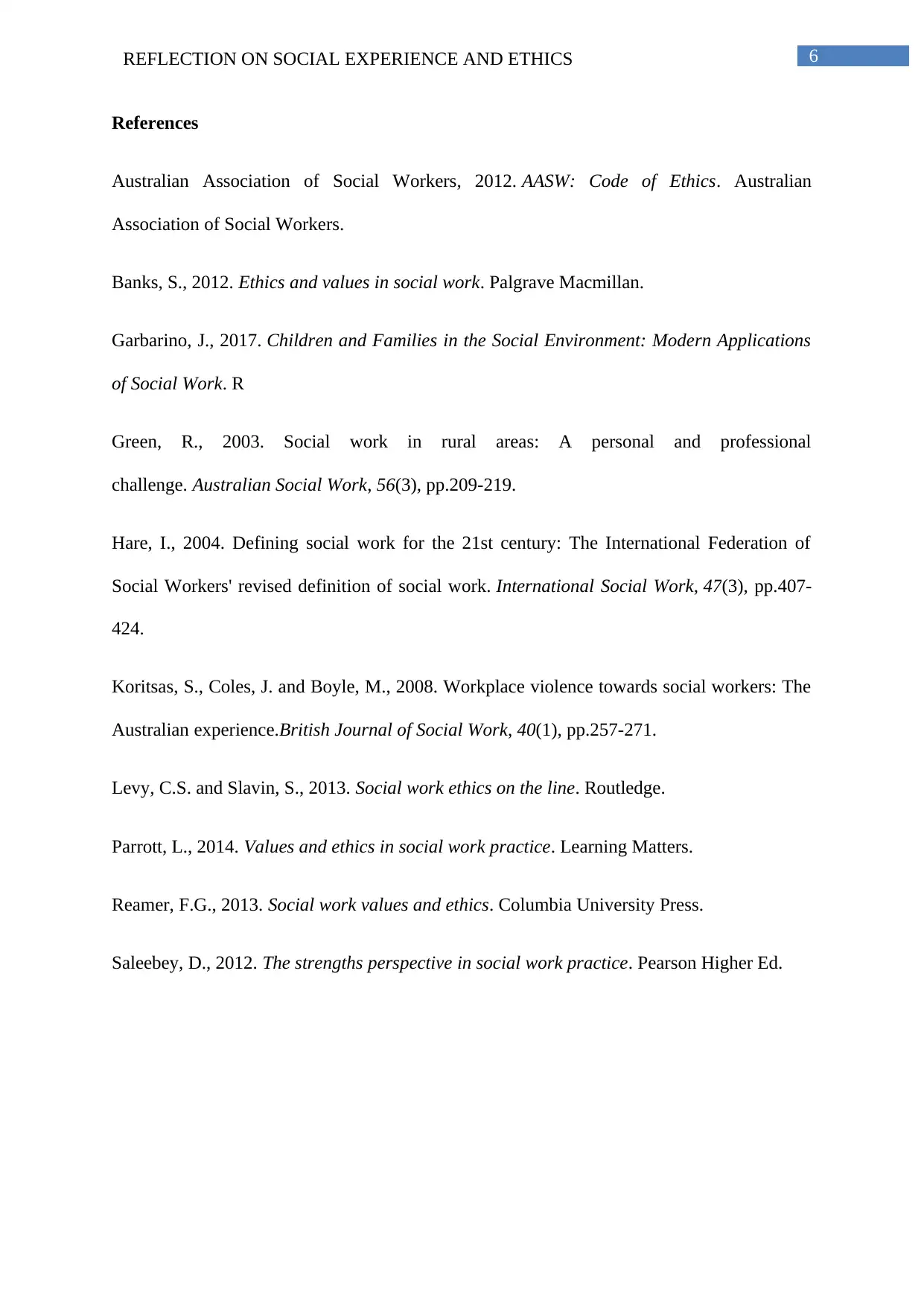
6REFLECTION ON SOCIAL EXPERIENCE AND ETHICS
References
Australian Association of Social Workers, 2012. AASW: Code of Ethics. Australian
Association of Social Workers.
Banks, S., 2012. Ethics and values in social work. Palgrave Macmillan.
Garbarino, J., 2017. Children and Families in the Social Environment: Modern Applications
of Social Work. R
Green, R., 2003. Social work in rural areas: A personal and professional
challenge. Australian Social Work, 56(3), pp.209-219.
Hare, I., 2004. Defining social work for the 21st century: The International Federation of
Social Workers' revised definition of social work. International Social Work, 47(3), pp.407-
424.
Koritsas, S., Coles, J. and Boyle, M., 2008. Workplace violence towards social workers: The
Australian experience.British Journal of Social Work, 40(1), pp.257-271.
Levy, C.S. and Slavin, S., 2013. Social work ethics on the line. Routledge.
Parrott, L., 2014. Values and ethics in social work practice. Learning Matters.
Reamer, F.G., 2013. Social work values and ethics. Columbia University Press.
Saleebey, D., 2012. The strengths perspective in social work practice. Pearson Higher Ed.
References
Australian Association of Social Workers, 2012. AASW: Code of Ethics. Australian
Association of Social Workers.
Banks, S., 2012. Ethics and values in social work. Palgrave Macmillan.
Garbarino, J., 2017. Children and Families in the Social Environment: Modern Applications
of Social Work. R
Green, R., 2003. Social work in rural areas: A personal and professional
challenge. Australian Social Work, 56(3), pp.209-219.
Hare, I., 2004. Defining social work for the 21st century: The International Federation of
Social Workers' revised definition of social work. International Social Work, 47(3), pp.407-
424.
Koritsas, S., Coles, J. and Boyle, M., 2008. Workplace violence towards social workers: The
Australian experience.British Journal of Social Work, 40(1), pp.257-271.
Levy, C.S. and Slavin, S., 2013. Social work ethics on the line. Routledge.
Parrott, L., 2014. Values and ethics in social work practice. Learning Matters.
Reamer, F.G., 2013. Social work values and ethics. Columbia University Press.
Saleebey, D., 2012. The strengths perspective in social work practice. Pearson Higher Ed.
1 out of 7
Related Documents
Your All-in-One AI-Powered Toolkit for Academic Success.
+13062052269
info@desklib.com
Available 24*7 on WhatsApp / Email
![[object Object]](/_next/static/media/star-bottom.7253800d.svg)
Unlock your academic potential
Copyright © 2020–2026 A2Z Services. All Rights Reserved. Developed and managed by ZUCOL.



